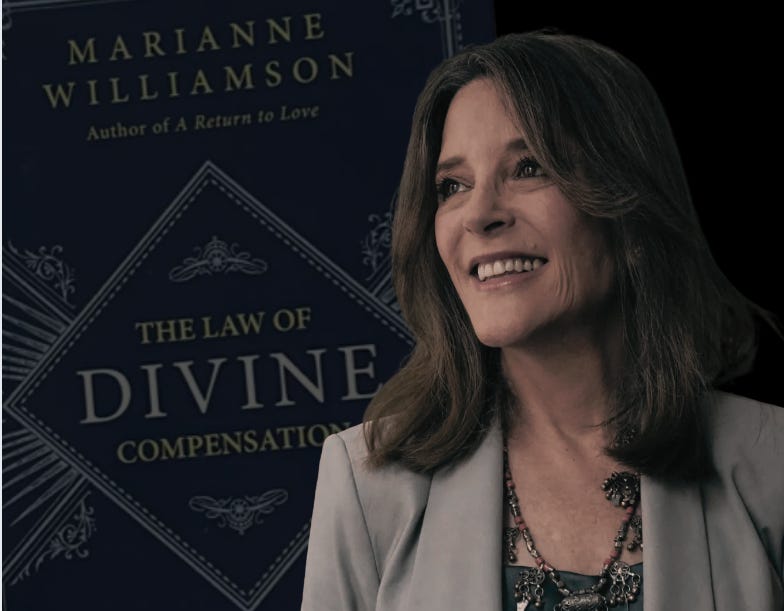The Business Model Love Deserves: A Structural Response to the Economics of Self-Worth
What Marianne Williamson named, this system was built to hold—with clarity, design, and emotional integrity that actually earns.
If you’ve ever felt like your income and your integrity were speaking two different languages, this essay is for you.
Last year, I cast my primary vote for
.Not because I thought it would change the outcome of the Michigan primary.
And not just because I’ve admired her work during my personal development journey.
She earned my vote because she named something few politicians—from any side—are willing to say:
That behind our economic systems lies a deeper fracture—a soul wound we rarely acknowledge.
She spoke of love as a public ethic.
Of compassion as strength.
Of healing as a necessity—not an indulgence.
She dared to ask not just what works, but what’s worthy.
Not just what sells, but what restores.
That message hit home.
Not as a partisan endorsement—but as a personal reckoning.
Because while she was calling for a moral awakening in public life, she was also one of the few speaking to a quiet truth many of us feel:
That the old “American Dream” playbook isn’t working anymore.
The economic models and career trajectories we were taught to trust—regardless of political belief—too often don’t match today’s reality.
And trying to follow them doesn’t just fall short. It quietly erodes our confidence, our energy, and sometimes even our sense of self-worth.
So when I heard Marianne speak about the emotional undercurrent of our economy, it didn’t just resonate.
It reflected what I’d lived.
Because I followed those models—until they stopped working.
And I paid the price for trying to make them fit.
I had to learn the hard way:
Love alone doesn’t pay the rent.
And neither does performance without purpose.
But somewhere in between is the business model love actually deserves.

When Insight Isn’t Infrastructure
Marianne Williamson gave people permission to feel again. But for too many of us, that emotional opening led straight into a structural void:
How do you express vulnerability in industries still obsessed with polish and orderly compliance?
How do you price your work without feeling like you’re betraying your values?
How do you protect your energy from being consumed by business models never built for people like you to succeed?
We were told: Lead with love. Show up authentically. Surrender.
But no one told us what to build around that love.
And so emotional clarity without structural clarity quickly turns into emotional labor—or other forms of invisible labor.
Some become emotionally fluent—but financially indifferent.
Some are spiritually grounded—but economically vulnerable.
They’ve done some “inner work”—but don’t have a business model that can honestly reflect it.
Others may be masters of structure—but lack a permission structure for emotional intelligence to play a meaningful role in their work.
They’re often highly efficient, high-functioning, and pragmatic—
but cut off from the very human values that would make their business feel purposeful, not just technically polished.
Both groups are underserved.
And both are ready for something better.
But this isn’t just about adding a heart to your business plan.
And this isn’t about withholding your heart, either.
It’s about recognizing that emotional intelligence and economic integrity were never meant to be separate categories.
We don’t need to choose between structure and soul.
We need to design from where they meet.

Where Vision Meets Design
Marianne Williamson didn’t just offer a program. She offered a pulse—a call to reconnect with what matters.
A disruption of numb economics.
But that kind of insight still begs for infrastructure.
Because if your values have nowhere to live, they’ll either calcify into rhetoric or get diluted by necessity.
We don’t just need new beliefs.
We need new behavioral designs that make those beliefs livable.
That means reimagining how we build our businesses:
Pricing: not for optics, but for congruence
Marketing: not through emotional manipulation, but through authentic resonance
Service delivery: not based on over-functioning, but grounded in real accountability
Here’s the truth most people miss:
Most people don’t fail to live their values because they don’t care. They fail because they inherited models that punish integrity and reward performance.
They try to do good inside systems that were never designed to support goodness—only compliance, scale, and speed.
So even when their beliefs evolve, their business still runs on blueprints that contradict them.
They don’t know how to rebuild.
They just know they’re tired.
But when your structure finally matches your values, something profound happens:
You stop performing goodness—and start operationalizing it.
You stop leaking energy—and start compounding trust.
You stop fighting your business—and start being held by it.
Your revenue becomes a reflection of your congruence—
not a reward for distortion.
Your ambition feels ethical again.
Because it’s not enough to want to be of service.
We need systems that prevent that service from becoming self-sacrifice.
And we need to name this truth out loud:
Without new designs, the most beautiful visions will collapse under pressure.
And the most principled leaders will keep burning out in systems that were never built to hold them.

What the Law of Divine Compensation Got Right
I often recommend clients buy a copy of The Law of Divine Compensation—especially if they’re seeking spiritual permission to grow their businesses. Published in 2012, it serves as a modern, yet accessible distillation of the economic principles one would learn from studying A Course in Miracles.
One line that struck me when I first read the book six years ago as I was experiencing my own financial collapse:
“It seems easier to have faith in the power of economic loss than to have faith in the power of economic gain.“
This kind of faith is one of the hardest subconscious conditionings holding most people back economically. I often ask my clients and in my seminars:
Is it easier to envision a chain of events that could lead to bankruptcy—or one that multiplies your income tenfold?
Most people are enduring circumstances where the former feels more likely than the latter. Partly because we’ve been conditioned to fear the former so intensely—and almost never allowed to even dream of the latter.
So we need to cultivate a shift in our collective faith that allows us, as Williamson writes, “to see beyond what’s happening to what could be happening, thus creating the space for something new.”
Because “Faith is power.”
And you don’t need to be religious to wield that power. Whether you call it faith, conviction, or pattern recognition—the effect is the same: it directs your energy toward what you’re willing to build.
And we need to trust our structural ability to carry that power—if we want to shape a different economic reality.
“To whatever extent your mind is aligned with love, you will receive divine compensation for any lack in your material existence. From spiritual substance will come material manifestation.”
That principle may be spiritually constant—
but for too many, the manifestation never arrives.
Not because the law is wrong,
but because the structure isn’t there to receive it.
Too many are taught to have faith in abundance—
but are never shown how to design for it.
They’re told the universe would provide—
but never how to build structures that allow provision to flow—
without distortion, leakage, or performance pressure.
They were taught to “attract”—but not to architect.
You cannot magnetize what your infrastructure cannot hold.
That’s where spiritual law meets structural congruence.
Williamson shows how love can be the organizing principle of the universe.
But love, too, needs reinforced scaffolding.
In a business context, that means:
Offers that don’t punish you for being ethical and considerate
Pricing that doesn’t reward posturing or pressure
Marketing rooted in structural truth—not emotional manipulation
Sales that don’t require soul contortions to convert
Fulfillment that honors your energy and your client’s transformation—not just their transaction
If divine compensation holds truth—and I believe it does—
then it deserves a business model built on divine structure.
Not divine hustle.
Not divine branding.
Not divine luck.
Divine design—deserving of our faith.
And you don’t have to practice any particular faith to benefit from it.
Because faith is power—for all!

A Quiet Alternative to the Loud Economy
Since the release of A Return to Love, the market has exploded with self-development and coaching advice.
Some of it is genuinely inspiring.
Much of it is simply loud.
And far too much is riddled with the same scarcity cycles it claimed to cure.
Those who answered the call to live more authentically often found themselves caught in a double bind:
Perform to be seen.
Hide to be safe.
Neither option is sustainable.
But there is a third path—
One where structure supports spirit.
Where integrity isn’t a buzzword—it’s a blueprint.
Where the economic model itself reflects the emotional clarity it’s meant to protect.
And it doesn’t require you to be louder, trendier, or more productive than you are.
It only requires that what you build actually fits you.
Why This Matters Now
I’ve seen what happens when brilliant, values-driven people burn out—
not from lack of effort, but from systems that were never designed for how they work or who they are.
They’re told they have a “mindset problem.”
But more often than not, the real problem isn’t internal resistance—it’s external misfit.
And while some keep contorting themselves into shapes that sell,
others quietly opt out—choosing survival over strategy, or retreat over growth.
But it doesn’t have to be that way.
We can build new scaffolding.
We can normalize income that’s both sustainable and soul-aligned.
We can stop equating burnout with leadership.
And we can do it without waiting for institutional permission—
or political salvation.
Because what love really needs right now
isn’t another promise.
It’s a pattern that holds.

A Synthesis of Universal Law and Economic Design
Marianne Williamson wasn’t the only one pointing toward a more ethical, integrated way of living and earning.
She stood at the emotional frontier.
Others—like Charlie Munger and Jack Bogle—laid the groundwork for the structural and behavioral terrain.
What makes this moment different isn’t just that we’ve heard their calls—
It’s that we can finally build what they each pointed to.
The behavioral clarity of Charlie Munger: incentives aligned with action.
The structural simplicity of Jack Bogle: integrity that compounds.
The spiritual intelligence of Marianne Williamson: love as economic alignment.
What if these aren’t opposing schools—but three coordinates of a shared foundation?
What if the future we’re reaching for is one that honors all three—and lets us design systems where love, structure, and behavior no longer compete?
And what if this isn’t a personal brand or a movement—but a missing pattern the world’s been waiting to make real?
My next post completes this synthesis:
Additional questions to reflect on:
What values are trying to come alive in your business?
Do your current systems support them—or silently work against them?
And what might shift if your income finally matched your internal clarity?
Because love, like any energy, needs a structure.
And when it has one—it doesn’t just heal.
It holds.
If you missed the previous two essays—or you weren’t sure about them—they might make even more sense now:
Thank you for reading.
If you’re ready to go further in your business—
If you want your income to match your clarity,
and your structure to finally reflect your values—
then we should talk.
👉 Here or on LinkedIn.
Because the systems that hold wealth, trust, and talent
should be built to quietly endure.
And if you’d like to learn more about my work, you may bookmark the following:










